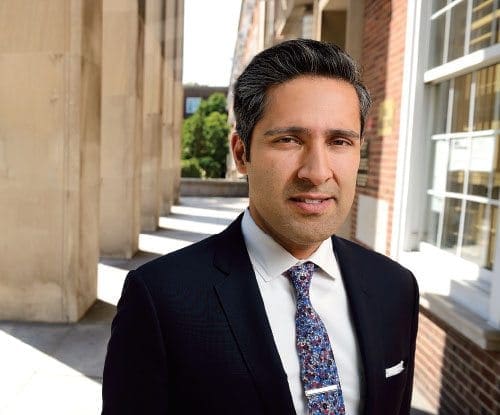A social services agency referred them to the office of Sateesh Nori ’97, attorney-in-charge of the Queens Neighborhood Office of the Legal Aid Society, a nonprofit that provides those living at or below the poverty line with free legal representation in civil cases. Digging into court records, Nori and his team found that the landlord had made numerous errors in previously filed legal papers, and because of these mistakes, the landlord shouldn’t have been entitled to evict his tenants. The judges presiding over the disputes agreed, and the evictions, which were days away, are now on hold indefinitely.
“This [eviction scheme] was meritless and devoid of compassion and humanity,” Nori told the Daily News in a follow-up article last May. “Both our clients deserve a home and a life free of landlord harassment.”
It’s the kind of case that typifies Nori’s career. Since graduating from New York University School of Law in 2001, Nori has fought for the rights of the poor and disenfranchised while working at several legal assistance agencies in New York’s boroughs. While Legal Aid helps people with all types of civil cases, from divorce to credit card debt, Nori has long specialized in disputes involving housing and eviction. His accomplishments were noticed in 2015 by the New York Law Journal, which selected him as one of its “50 Rising Stars.”
“Neighborhoods are changing in New York, and there’s real pressure on the real estate market,” says Nori, 41. “Landlords seek to make more money by charging higher rents to new tenants. This motivates them to push out long-term and low-income tenants who are already living in these apartments. Unfortunately, there is not enough affordable housing to accommodate those in need.”
Nori, who was born in India and moved to the United States with his parents when he was a child, is the first South Asian attorney to direct a borough-wide office of a legal services organization in New York City. It’s an accomplishment that makes him feel particularly honored.
“It’s important because a large portion of Queens is made up of immigrants like me,” he says. “There are 150 languages spoken in Queens. For someone in need to see a familiar and friendly face, I think that’s important. I’m proud to be able to help.”
At Legal Aid, Nori oversees an office of 70 attorneys and paralegals. The organization receives funding from private donations as well as local and federal sources, which have been threatened by cuts proposed by the Trump administration. Trying to do more with less has been one of the biggest challenges during Nori’s managerial tenure at Legal Aid. “The hardest part of this job is to turn people away, to tell them, ‘Sorry, but we don’t have the resources to help you,’” he says. “That’s really frustrating. We need to fight to make access to justice for the poor a national priority.”
For Nori, who says he always wanted to be an attorney, the greatest satisfaction is restoring fairness to an imbalanced legal system that favors those with means. “Representing the poor is one of the more interesting and challenging areas of the law,” he says, “but it also has the bonus of having a real impact on people’s lives.”

